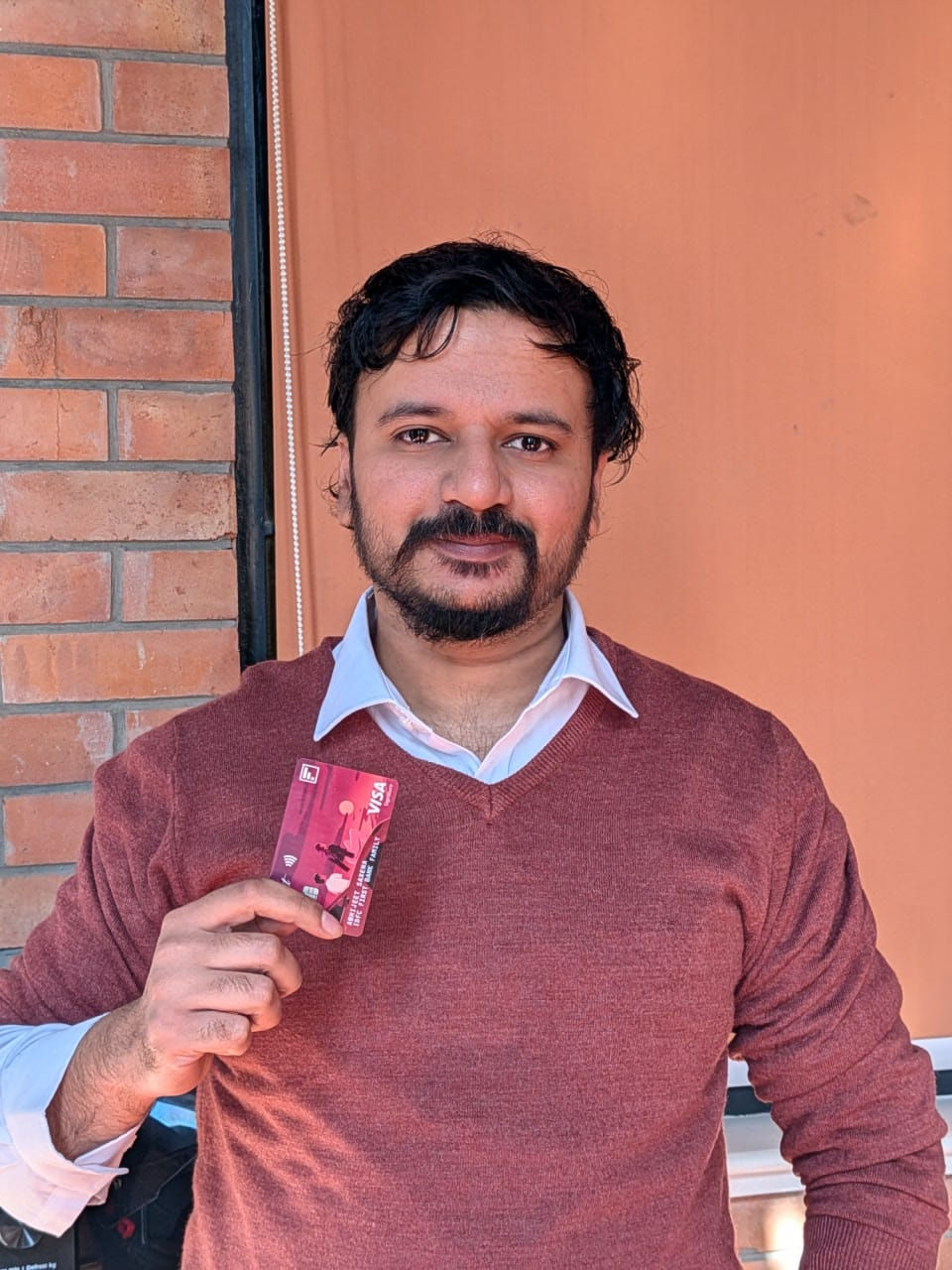Travelling Abroad - Wait - Learn How You Can Save Lakhs - Credit Card v. Prepaid Forex Card
- Abhijeet Saxena
- Jan 6, 2024
- 6 min read

If you are planning to travel abroad, one of the most important decisions you have to make is how to carry your foreign currency. You have several options, such as cash, credit cards, debit cards, traveller's cheques, and forex cards. But which one is the best and cheapest way to pay for your expenses in a foreign country? In this blog, we will compare two popular options: forex cards and credit cards, and help you decide which one suits your needs better.
What are Prepaid Forex Cards?
Think of them as debit cards pre-loaded with foreign currency. You choose your preferred currency (USD, EUR, etc.), load it up with INR, and voila! You're ready to spend like a local in that exotic destination. No more scrambling for exchange bureaus or carrying wads of cash. Just swipe, tap, or withdraw, and enjoy the freedom of cashless transactions.
Benefits of Waving a Forex Card:
Convenience: Ditch the currency exchange queues and worries about carrying large amounts of cash. No more hidden fees or fluctuating exchange rates at the airport.
Security: Unlike cash, prepaid cards are protected against theft or loss. If you lose your card, you can block it immediately and minimize risk.
Budgeting: Load your card with a specific amount, making it easier to stick to your travel budget and avoid overspending.
Tracking: Most cards offer online statements and transaction tracking, helping you monitor your spending and keep tabs on your budget.
Potential Savings: Some cards offer competitive exchange rates compared to money changers, saving you money on your foreign transactions.
Things to Consider Before You Swipe:
Fees: Compare transaction fees, loading charges, and annual charges before choosing a card. Some cards may have higher fees for specific transactions, like ATM withdrawals.
Currency Selection: Choose a currency relevant to your destination. Loading multiple currencies can incur additional charges.
Validity and Usage: Check the card's validity period and ensure it's accepted in your chosen country. Some cards might have limitations on where they can be used.
Top-up options: Understand how you can reload your card if you need more currency during your trip.
Types of Prepaid Forex Cards:
Single Currency Cards: Ideal for travel to one specific country or region.
Multi-Currency Cards: Load multiple currencies for trips to various destinations.
Travel Cards: Offer additional benefits like travel insurance, airport lounge access, and emergency assistance.
Choosing the Right Card:
Assess your travel needs: Consider your destination, spending habits, and desired features.
Compare different cards: Look at fees, exchange rates, and additional benefits.
Read reviews and ratings: Get insights from other travelers who've used the card.
Tips for Using Your Prepaid Forex Card:
Notify your bank: Inform your bank about your travel plans to avoid potential fraud alerts.
Carry a backup credit or debit card: Always have a backup in case your forex card gets lost or blocked.
Monitor your balance: Keep track of your spending and reload your card if needed.
Avoid dynamic currency conversion: Opt for local currency transactions to avoid inflated rates.
Prepaid forex cards are not magic wands, but they can be powerful tools for smart and secure international spending. By understanding their features, choosing the right card, and using them wisely, you can navigate the world of foreign currencies with confidence and ease. So, pack your bags, grab your forex card, and embark on your next adventure – the world awaits!
Credit Card V. Forex Cards
Forex cards are prepaid cards with which you can conduct transactions in foreign currency without incurring any fee for such transactions. As compared to credit cards that charge foreign exchange mark-up fee (ranging from 1.75% to 3.5%) over and above the exchange rate, forex cards are very economical as they carry no charges per transaction. You can load one or multiple currencies on a forex card, depending on the card issuer. Some forex cards let you load up to 15 currencies. You can use a forex card to withdraw cash in foreign currency, check your balance, and pay for shopping in foreign currency. You can also top up the card depending on your requirement.
Credit cards are plastic cards issued by banks or financial institutions that allow you to borrow money up to a certain limit and pay it back later with interest. Credit cards are widely accepted around the world and are a convenient way to pay, but they come with a cost. When you use a credit card abroad, you have to pay a foreign transaction fee, which is usually a percentage of the transaction amount, plus a foreign exchange mark-up fee, which is the difference between the exchange rate applied by the card issuer and the interbank rate. These fees can add up to a significant amount over time.
What are the benefits of forex cards over credit cards?
Forex cards have several advantages over credit cards when it comes to travelling abroad. Here are some of them:
Protection from volatility in forex rates: In the case of forex cards, the foreign exchange conversion rate is locked as soon as you load the money in to it. This means that you are protected from any fluctuations in the exchange rate during your trip. However, in the case of credit cards, the rates are applied at the time of the transaction. This means that you are vulnerable to any changes in the exchange rate between the time of booking and the time of payment.
Savings on transaction fees: Forex cards do not charge any transaction fees or foreign exchange mark-up fees. This can save you a lot of money compared to credit cards that charge both these fees on every transaction. For example, if you spend $1000 abroad using a credit card that charges 3% foreign transaction fee and 2% foreign exchange mark-up fee, you will end up paying $50 extra. But if you use a forex card that charges no fees, you will save that amount.
Safety and security: Forex cards are safer than cash or credit cards as they can be blocked if you lose them or they are stolen. You also get insurance bundled with some forex cards that cover you against theft, loss, or misuse of the card. Credit cards also offer some protection against fraud or theft, but they may not cover all your losses or expenses. Moreover, if your credit card is stolen or cloned, you may have to deal with a lot of hassle and stress to dispute the charges and get your money back.
Budgeting and control: Forex cards help you plan and manage your budget better as you can load only as much money as you need on the card. You can also track your spending and balance online or through SMS alerts. Credit cards, on the other hand, may tempt you to overspend or incur interest charges if you do not pay your bill on time.
What are the drawbacks of forex cards compared to credit cards?
Forex cards are not perfect either. They have some limitations and disadvantages compared to credit cards. Here are some of them:
Availability and acceptance: Forex cards may not be available or accepted everywhere. You may have to apply for a forex card well in advance before your trip and collect it from a bank branch or an authorized dealer. You may also face some issues while using a forex card at certain places such as hotels, car rentals, or online merchants that may require a pre-authorization or a deposit on your card. Credit cards, on the other hand, are more widely available and accepted, and can be used for any kind of transaction without any hassle.
Reload and expiry: Forex cards have a validity period, usually of 3 to 5 years, after which they expire and cannot be used. You also have to pay a fee to reload or transfer money to your forex card. Credit cards do not have any expiry date or reload fee, and you can use them as long as you pay your bills on time.
Rewards and benefits: Credit cards offer various rewards and benefits such as cashback, discounts, air miles, lounge access, insurance, etc. that can enhance your travel experience and save you money. Forex cards do not offer any such rewards or benefits, except for some basic insurance coverage.
Conclusion
Forex cards and credit cards are both useful options for travellers, but they have their own pros and cons. Forex cards are cheaper, safer, and more stable than credit cards, but they are less convenient and flexible. Credit cards are more widely accepted and offer more rewards and benefits, but they are more expensive and risky. Ideally, you should carry a mix of both, depending on your travel needs and preferences. You can use a forex card for most of your transactions abroad, and keep a credit card as a backup option in case of emergencies or special situations. This way, you can enjoy the best of both worlds and have a hassle-free and enjoyable trip.





























Update info kabar4d